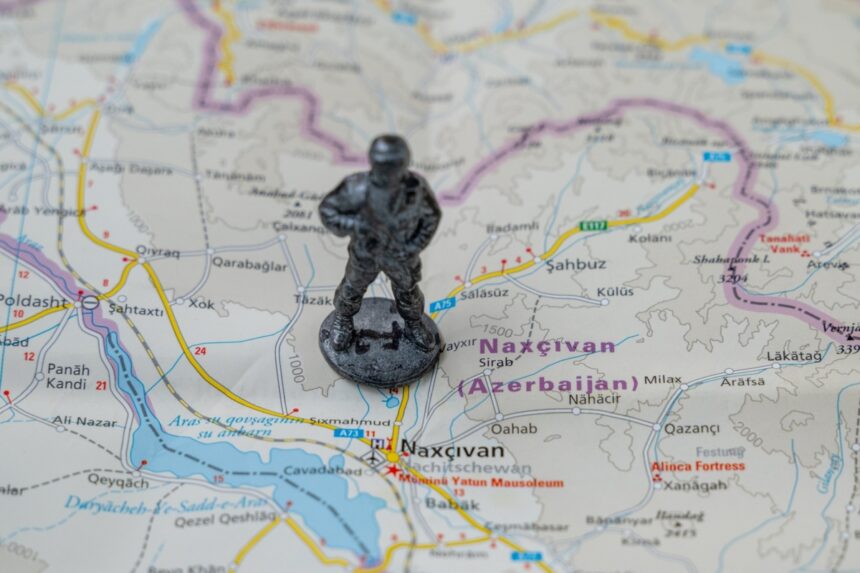A police raid in Yekaterinburg on June 27 was supposed to be routine—a law enforcement operation tied to long-dormant criminal investigations involving organized crime. Instead, it ignited one of the sharpest ruptures in Russian foreign relations since the invasion of Ukraine and may very well mark the beginning of the end of Moscow’s long shadow over the South Caucasus.
Acting on what they claimed was intelligence related to a decades-old string of mafia-style assassinations, Russian special forces stormed multiple residences in the Ural city of Yekaterinburg. Their targets: ethnic Azerbaijani men—some Russian citizens, others long-time residents—whom authorities suspected of participating in a sprawling criminal network. But the force and fury with which the operation was carried out stunned observers and drew widespread condemnation. Within hours, images began circulating online of shattered windows, bloodied faces, and terrified family members.
And within days, two of those detained—Ziyaddin and Huseyn Safarov—were dead.
The Russian Investigative Committee offered a sanitized narrative: one brother died of heart failure, the other was under examination. But Azerbaijani authorities, upon receiving the bodies, found evidence of severe blunt-force trauma, bruising, and what they described as signs of torture. An autopsy conducted in Baku confirmed what many feared: these were not natural deaths. They were, in Azerbaijan’s words, “murders committed with extreme cruelty.”
Russia called it a standard criminal operation. Baku called it a national insult. And in a region where symbolism often matters as much as sovereignty, the deaths of two ethnic Azerbaijanis at the hands of Russian security forces were not interpreted as an isolated abuse of power. They were seen as a warning—a flashback to imperial dynamics many thought were gone.
The backlash was swift. Azerbaijan’s Foreign Ministry issued an unusually forceful condemnation. State television aired prime-time denunciations of Russia’s “colonial behavior” toward former Soviet republics. All cultural events involving Russian artists were immediately canceled, and diplomatic channels were frozen.
On June 30, Azerbaijani authorities escalated further by arresting two Russian journalists working for Sputnik Azerbaijan, accusing them not just of propagandistic reporting but of active cooperation with Russia’s FSB intelligence service. Soon after, more Russian nationals—described in local media as “tourists” or “tech workers” from Yekaterinburg—were detained in Baku on charges of drug trafficking and cybercrime. Photos from the courtroom showed some with visible bruises, suggesting retaliation in kind.
The Kremlin responded with remarkable restraint. Spokesperson Dmitry Peskov characterized Baku’s reaction as “emotional” and “disproportionate,” adding that the Safarov brothers were Russian citizens, not foreign nationals. But this legal framing did little to calm tensions. In Baku’s view, ethnic solidarity and geopolitical dignity outweighed technicalities.
In this light, Yekaterinburg was not a police raid. It was a geopolitical catalyst.
From Brotherhood to Breakdown
The deaths of the Safarov brothers were the final fracture in an already brittle relationship, but they were part of a larger arc of tension—one that included the downing of an Azerbaijani civilian airliner by Russian air defenses in December 2024, Moscow’s passivity during Azerbaijan’s 2023 retaking of Karabakh, and the Kremlin’s repeated failure to acknowledge Baku’s growing assertiveness on the world stage.
Just two years ago, Moscow and Baku had signed a “Declaration on Allied Interaction.” But the relationship never recovered from a December 2024 incident in which a Russian missile battery downed an Azerbaijan Airlines passenger jet over Grozny, killing 38 people.
What added insult to injury was not just the tragedy, but the manner of the apology: the first official to contact Baku was Ramzan Kadyrov, Chechnya’s strongman, not President Putin. That personal slight reportedly stung Ilham Aliyev, who considered it a signal of disrespect. This was the emotional rupture that transformed private frustrations into public confrontation.
Now, just months later, Baku has gone further than anyone expected. This was not the Russia of 2008 or 2014, when it invaded Georgia and annexed Crimea in the name of protecting its “compatriots abroad.” This was a weakened Russia, preoccupied with its quagmire in Ukraine, navigating economic sanctions, and diplomatically isolated in the West.
Baku sensed this vulnerability—and acted decisively.
The once-unthinkable had happened: a former Soviet republic had stared Moscow down—and refused to blink.
The Zangezur Corridor: From Infrastructure to Influence
Amid the spiraling diplomatic crisis between Baku and Moscow, a once-obscure infrastructure proposal—the Zangezur Corridor—has re-emerged as the geopolitical battleground of the South Caucasus, linking not only regional grievances but global rivalries.
At its core, the corridor is a proposed land route connecting mainland Azerbaijan to its western exclave, Nakhchivan, by crossing Armenia’s Syunik province. Though referenced in the 2020 Russia-brokered ceasefire agreement after the Second Karabakh War, it was never fully implemented. For Moscow, the corridor offered an elegant opportunity: Russian FSB border guards could be stationed in southern Armenia, deepening Russia’s strategic footprint without direct annexation or occupation. It would project influence southward—toward Iran, Turkey, and even the Gulf—all while acting as a “security guarantor.”
But that model has now unraveled.
With Russia bogged down in Ukraine and its credibility as a regional peacekeeper in tatters, a new actor has stepped in: the United States. According to multiple reports and diplomatic sources, Washington has proposed that the corridor be administered not by Russian security forces, but by a neutral international logistics firm, operating under U.S. and European security parameters.
The idea reportedly originated during Trump’s first term, when his administration sought to undermine Russian and Iranian influence in the South Caucasus. It was further refined during Biden’s presidency and is now regaining momentum amid rising U.S.–China tensions, Turkey’s regional assertiveness, and Russia’s diplomatic retreat.
The American plan serves two immediate objectives:
- Preserve Armenia’s sovereignty and customs jurisdiction, which Yerevan insists is non-negotiable.
- Guarantee unimpeded movement for Azerbaijan, which wants to bypass Armenian control entirely.
The corridor would sever a key axis of Russian power. For years, Moscow has cultivated the International North–South Transport Corridor as a way to connect to Iran and the Persian Gulf via Azerbaijan. This land bridge is crucial for sanctions circumvention, energy exports, and military cooperation with Tehran. But the Zangezur Corridor, if completed under Western oversight, would flip that dynamic. It would provide Azerbaijan—and by extension Turkey and NATO—with a direct, secure, and Russian-free route to Central Asia. It would also open the door for American logistical presence in the heart of the Caucasus, thereby wedging between Russia and Iran. The physical geography of influence would tilt westward.
But the Zangezur Corridor is not only about Armenia and Azerbaijan—or even about Russia’s fading influence.
It is also about China.
The corridor sits at a crucial juncture in Beijing’s Belt and Road Initiative (BRI), the vast infrastructure and trade network that aims to connect China to Europe via Central Asia and the South Caucasus. Currently, much of China’s westward cargo travels through Kazakhstan, the Caspian Sea, Azerbaijan, Georgia, and onward to Turkey and Europe—a route known as the Middle Corridor.
The Zangezur route would provide a shorter, more secure, and geopolitically balanced alternative, bypassing both Russia and the instability of the Black Sea. By linking Nakhchivan directly to Azerbaijan proper—and then on to Turkey—it offers a seamless land bridge from Central Asia to Europe.
This is precisely why China, Russia, Turkey, the U.S., and the EU all have stakes in the outcome. Thus, the Zangezur Corridor is no longer just a road. It is a litmus test for the balance of power in Eurasia.







